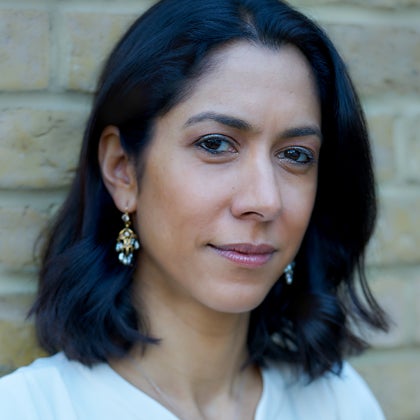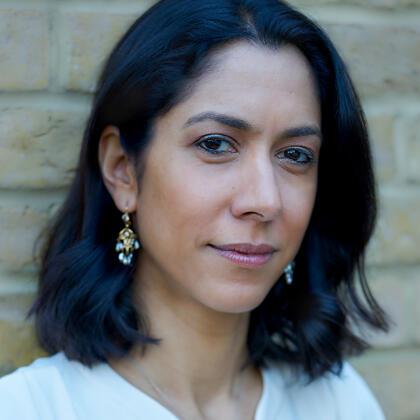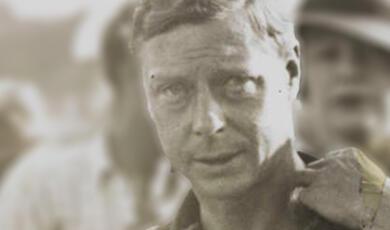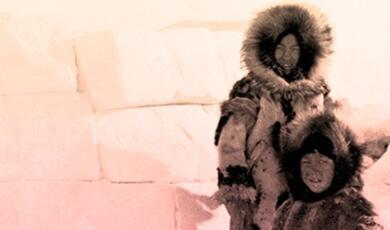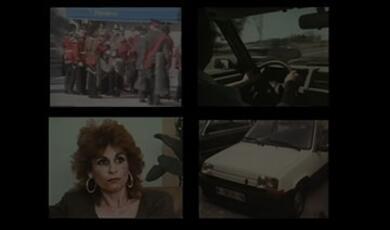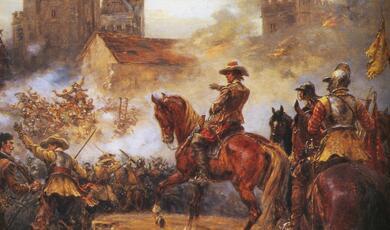Partition of British India: 75 Years On
Share
- Details
- Text
- Audio
- Downloads
- Extra Reading
The 2022 Royal Historical Society Colin Matthew Memorial Lecture
The partition of British India in 1947 was the world’s largest migration outside war and famine. It may feel like a distant historical event, but 75 years on its impact continues to resonate in India, Pakistan, Bangladesh and in Britain. Many of those who lived through that tumultuous time migrated to Britain.
In this lecture, which considers the importance and power of oral history, we will hear first-hand testimonies; understand why many partition survivors chose silence and are speaking now, and how its legacy persists down the generations.
Download Text
Partition of British India: 75 Years On
Professor Kavita Puri
1st November 2022
It’s 75 years since the British left India and partitioned it into the dominions of India and Pakistan. Independence and partition forever intertwined. It may appear an event that happened far away and is consigned to history. But the ramifications of the decision to divide British India can still be felt in the politics of the Indian subcontinent today. And it endures in the lives of people who lived through that time – many of whom came to Britain in the post-war years, its former colonial rule. But we are now in the twilight years where the generation - who were born under the British Raj and witnessed the end of empire – are dwindling and will soon no longer be with us. They are only just speaking of that time. We still have time to record their experiences and ask what inheritance is bequeathed to subsequent generations – both within families here in Britain and how we as a nation reckon with our colonial past.
Partition was not inevitable. Britain had direct rule over India since 1858, though had a significant presence there since the arrival of the East India Company in the 1600s. Resentment against British rule festered and by the 20th century the independence movement gained momentum, hastened by Britain taking India into World War II. It was a war India neither asked nor agreed to join. An estimated 2.5 million Indians served.
As religious identity became stronger, many argue stoked by British policies of divide and rule – two competing visions of independence emerged, which grew increasingly politicised along religious lines. As the departure of Britain became imminent, the pressing concern was the power balance the Hindu majority and the Muslim minority were going to share. Many Muslims, who formed a quarter of the 400 million population, were concerned about how their new nation-state would protect their interests. The fight for their rights was led by Mohammad Ali Jinnah, leader of the Muslim League, it would eventually culminate in the demand for a separate country. The Congress party led by Jawaharlal Nehru had a different view, they wanted a secular, united India, once the British had gone.
The endgame of empire and the contest for power and territory, was conducted against a backdrop of rising communal violence across northern India, as people from the “other” religion were targeted. There had been localised communal violence before, but this was on a different scale altogether. It sought to humiliate even destroy the “other.” In some cases, there was a high degree of planning and organisation, in other cases attacks were carried out in response to killings or abductions in their own communities. The watershed moment was the Calcutta killings of August 1946. Jinnah had called a “Direct Action Day” in favour of the establishment of Pakistan, but it precipitated thousands of deaths of Muslims and Hindus. Unrest and bloodshed spread to Noakhali, Tippera, Bihar and close to Delhi and from early 1947 to the major cities in Punjab.
This was the context that negotiations took place for the exit strategy of the British. On June 3rd, 1947, Lord Louis Mountbatten, the last Viceroy to India made an announcement, alongside Jinnah and Nehru. He declared India would be partitioned. Reluctantly, Nehru had agreed. Justifying it, Mountbatten said, “There can be no question of coercing any large areas in which one community has a majority to live against their will under a government in which another community has a majority – and the only alternative to coercion is partition.”
East and West Pakistan would be divided by over 1000 miles, as well as a different language, and culture. The populous provinces of Bengal and Punjab would be dissected along religious lines. These were places were communities had live entwined for generations. Ties to your land, where there was a common language, culture and food, could be stronger than ties to your religion. Their unpicking was a virtually impossible task. Lord Mountbatten then said the transfer date would not be June 1948 – the final date given by Prime Minister Clement Atlee. It would be brought forward to August 15th, 1947. That left a breath-taking 10 weeks to divide a nation as complex as India.
The man tasked with where to draw the boundary line was Cyril Radcliffe, a lawyer who had never been to India before. He arrived in early July and spent a lot of his time in the Viceroy’s House in Delhi surrounded by out-of-date maps and census. He never once visited the areas and villages he was dividing.
When independence came there was much joy. Finally, the British were leaving. Pakistan celebrated first in the new capital Karachi. In a speech Jinnah spoke directly to citizens of all religions in his new country, “you are free to go to your temples, you are free to go to your mosques or to any other place or worship in this State of Pakistan.”
At Midnight at the Red Fort in New Delhi, Nehru welcomed in independence with the now infamous words: “Long years ago we made a tryst with destiny, and now when the time comes when we shall redeem our pledge, not wholly or in full measure, but very substantially. At the stroke of the midnight hour, when the world sleeps, India will awake to life and freedom.” Astonishingly, even though officially Britain had handed over power, no-one knew which side of the boundary line they were on.
The line was announced two days later on 17th August. Radcliffe had already left India, and apparently burnt his papers and never returned. Writing to his stepson he said, “Nobody in India will love me for the award about the Punjab and Bengal and there will be roughly 80 million people with a grievance who will begin looking for me. I do not want them to find me.”
People listened on the radio or waited for news to be brought to their village to learn of their fate. The new border crossed agricultural land, cut off communities from their sacred pilgrimage sited, paid no heed to railway lines, and separated industrial plants from the agricultural lands where raw material was grown.
What happened next – no one had anticipated, neither the colonial authorities nor the new Indian and Pakistani governments. As people found themselves a minority in a new country they faced a decision: stay or leave. Millions chose the latter. In the months around partition, particularly in Punjab, between 10-12 million people moved across a new border making the dangerous journey by foot, or by train or if they were lucky by plane. Muslims to Pakistan, Hindus and Sikhs to India. It’s the largest migration the world has ever seen outside war and famine. An estimated million people – on all sides – were killed. Official figures say 75,000 women were raped, abducted and forced to convert to the “other” religion. The female body became part of the battlefield. Some women were killed by family members to save them from “dishonour.” What remained of the British army – had orders not to intervene – except to save the lives of Britishers.
It was not the end of violence and mass displacement triggered by Partition. In 1971, against huge resistance from West Pakistan, East Pakistan fought for its independence and became Bangladesh.
The statistics of partition are overwhelming. But behind every statistic is a human story, even if they can be hard to find in the official documents of the time. That was what I wanted to find out. During the 70th anniversary I was aware that partition as a historical event was not well known about in families here with South Asian heritage or wider British society – despite it being one of the defining moments of the 20th century and a part of British history. But it’s also a history so many British South Asian families have a direct or indirect connection to. And there is a correlation between partition and South Asian migration to Britain. In the post-war years many of the people who arrived in Britain came from areas hugely disrupted by partition: primarily the Punjab, but also places like Sylhet and Mirpur. They came with their stories but didn’t talk about them. As on the Indian subcontinent these memories were shrouded in silence, but for those coming to Britain there were different reasons for not speaking of that time too. They were looking ahead, trying to build a new life in a largely hostile environment. They were fighting for equality and against racism. There was no time to dwell on the past. These were shameful memories, terrible things happened on all sides, no-one wanted to speak out loud about. And there is an institutional silence, no-one talked about empire, there were no memorials to the human cost of partition, and there was no public space for survivors to voice their memories. Their children, born here, never learnt about it in schools, so never asked, perhaps they may not even be aware of what the word “partition” even was.
But silence can be noisy. Prejudice persisted, but there were other contradictory clues too. People talked of back “home”. But “home” was not the place the family lived now on the Indian subcontinent. There were gaps in family histories, as well as no-go areas in terms of conversations. And if you listened closely there may be a hesitation when asked “where are you from.” Is it the place you were born, or the place you moved to across the border?
70 years on I wanted to be part of breaking the silence. My team and I did call-outs and contacted grass-root organisations. I never approached people directly. I felt it was not appropriate given the traumatic nature of the memories. Children, or mostly grandchildren responded. I soon realised these stories were all around us in Britain.
I interviewed colonial British and British South Asians who were eyewitnesses to the end of empire, and the bloody birth of two nations, and made Britain home. I travelled across Britain, and in living rooms people opened up – sometimes speaking for the first time of recollections that were traumatic, wistful, and full of longing for a life and land long fled. The stories are far from a definitive account. But they show the complex tapestry of partition experiences.
Gurbakhsh Garcha was a former Mayor of Lewisham, and came to Britain in the 1950’s. He described his childhood in his small village in Punjab as magical and carefree. His family were Sikh, but religion was irrelevant. His best friend was a Muslim boy. So close were relations that when his Sikh aunt died leaving two tiny babies, her Muslim best friend raised and suckled her children. Gurbakhsh remembers receiving ladoos, Indian sweets, on Independence Day. He thought Nehru was the new King of India. Two days later, 12-year-old Gurbakhsh sat with the other men of the village around a radio to hear where the boundary line would be drawn. There was joy their village was in India, but shock that Lahore had gone to Pakistan. Sikh gangs started roaming the village looking for Muslims. Gurbakhsh’s best friend soon left, as did their family’s best friends, all Muslim. Gurbakhsh’s family kept their keys. Everyone hoped they would come back, but they never did. He described a peaceful mixed village that soon after partition had no Muslims left. There were disturbing scenes of violence and murder that he witnessed. He also recalled visiting a distant elderly relative’s home. There was a young beautiful Muslim girl, and in front of the Sikh men she was forced to eat pig fat off a spoon. Gurbakhsh recalled she was very distressed. The boy ran home to his mother, who called these men barbarians. He now thinks she was probably being raped, and that the village knew that but did nothing because, as he said, the same thing was happening to their women on the other side. These memories were something that Gurbakhsh spoke little of to his family. He describes himself as “agnostic,” and feels forever changed by that experience, of seeing how quickly men can turn into beasts.
Harchet Bains lives in Hitchin and came to Britain in the UK in 1964. He started work at a flour mill in Hitchin and went on to become an electrical engineer at Granada Television. He was a Sikh living in West Punjab, which had become part of Pakistan. He was eleven when he was suddenly told to gather in the square and prepare to leave. He slipped a favourite wooden spinning top into his pocket. He never had time to say goodbye to his best friend Mohammed Aziz. Hours later he and the other Sikh villagers began to walk, as they had heard that Sikhs and Hindus were being attacked in nearby villages. For days he is not sure how many, they walked in a long line – known as a kafila – towards the new border, as there was safety in numbers. He got used to seeing dead or injured people along the way. And the ends of the line were particularly vulnerable to attack. All he remembers was feeling hungry, and eating soft leaves, rubbed in chilli for taste. The rains were heavy, and they had to discard their bullock and cart, and belongings. His wooden spinning top had been replaced by leaves in his pocket. The family arrived in India with just the clothes on their back. They initially lived in a home that once belonged to a Muslim family that had fled, but it had been so badly attacked, it was barely a dwelling. His new schoolmates in India laughed at him for not having shoes and wearing old clothes. Harchet had to learn how to write in Hindi. Every 15th August he says he never celebrates independence. “They say we are independent now, but what good it was when you have lost everything.? It was a great tragedy, and we didn’t like being friends one day and enemies the next…we will always curse the authorities, the British or Indians, the politicians who made this mess. I will never forget these tragic events. Always remember. I will take these things to my grave...they were bad things. But they happened.”
In the opposite direction was Iftakhr Ahmed. He came to Britain in 1951. He was 17 and living in Delhi when independence took place. He remembered the day vividly, and how happy everyone was that the British were gone. He was a Muslim, and the creation of Pakistan meant nothing to him. “India was my home” he said, though he jokes “I am English as I was born under the British Raj.” A few weeks later the atmosphere had changed for Iftakhr. He was alone in the capital and scared. In a group of other Muslims, they made a treacherous journey across the city to the Jama Masjid for safety, a place where other Muslims were taking refuge. “Bodies lay like leaves on the road” he recalls. He saw some of the young women in the group being taken, he has no idea what happened to them. Once he arrived at the Mosque, the place was full of refugees, so he quickly moved to the Old Fort. “It was almost like the whole of Delhi was there” he recalls. He heard of a train going to Lahore and decided to take it. He was warned not to get on the train as it meant certain death, but he was desperate to leave. On the train he passed his childhood village near Gangoh, and then later stopped near the border. Everyone got out to eat, but he had no food. While he was milling around, another train came by, full of Pakistani military, he jumped on it and they hid him under the seat feeding him tea and biscuits. He arrived at Lahore station and immediately fell asleep on the platform when he awoke he felt wet. It was blood. He was lying with dead bodies. He believes it was the train he left, and everyone had been killed. He ran out of the station and never looked back. Today he wants to see Gangoh one last time before he dies. He remembers his Hindu friends, their childhood games, the alleyways. His parents are buried in India’s earth, as are his forefathers. “India was mine as well. No one can take that away” he says.
That attachment to the place left, even if no one has ever been back, is what surprised me doing the interviews, and it became a recurrent theme. I had expected to hear stories of trauma and violence, but not a visceral tie to the place that was left.
Raj Daswani was a Hindu from Karachi in Sindh province. He was 15 when he left by boat for Bombay (now Mumbai). He lived in a refugee camp for 12 years, where he learnt Hindi. In 1992 he returned to Karachi, on landing he fell to the ground touched the earth and put it to his forehead and said, “Mother I am home.” He returned to his old apartment, and the terrace he used to sit on with a Muslim girl, his neighbour, Yasmin, who in his teenage years in undivided India he hoped to marry. Even with cataclysmic background of partition, what he recalls is the detail of the love he left behind, and how he said goodbye to her, and watched her as he left in the horse and cart. On his return decades later, he picked up some stones from the ground. They now live in his study in north London. He says when he touches those stones it’s as If he is connected to the place he left. If he had a choice in his youth he says he would have converted to Islam as - for him – land meant more than religion.
That deep attachment to the place left behind, where generations of a family had lived, and the need for a physical object to show that they were there once too, is something I have seen in many households across Britain. It may be a brick from a childhood home in the centre of a living room, carefully preserved in a glass cabinet on a coffee table I have seen a jar of soil on a Victorian fireplace, and in another a photograph of a tile that is all any family member has of the ancestral house. These remnants are often the only evidence that a family has that they once existed in a place 75 years ago.
Across homes in Britain are these extraordinary stories, which came to light within families and the public space during the 70th anniversary, from the generation that lived through partition. It was particularly hard to excavate first-hand stories of the experiences of women and sexual violence. Some stories will always be shrouded in silence.
But what is bequeathed? The investigation into this inheritance is only now being looked into by historians. Nirmal Joshi grew up in Lahore – unlike many of my interviewees she did speak to her daughter about her experiences of partition. She told her daughter Poonam how her Muslim neighbour warned her parents to leave immediately as there was a plan to “take” Hindu girls. At great risk, the neighbour took them by cart to Lahore train station. Poonam grew up with a mixed legacy, the knowledge that people of the other religion transcended hate to save the other. But her mother’s experiences once in India of working in the camps and seeing what happened to women – who had been raped and mutilated - also showed her the worst of humanity. Her mother was always clear to point out such things happening to women were on both sides. When Nirmal was dying she sang Chupke Chupke, a song in Urdu – the official language of Pakistan - about a lost love, by Gulam Ali. It was played at her Hindu funeral. Her family wanted Nirmal’s ashes scattered in Lahore, the place Nirmal left aged 17, and never returned in life, as it was the place she was the happiest. Poonam says “It was her home. It was where she belonged, and we wanted to take her home.” That connection to Lahore persists down the generations.
What is passed down is complex. Many in the third generation contacted me asking how to approach an elderly relative or regretted that they never asked, as it is now too late. In Sparsh’s family there had always been a “hush” every time Pakistan or partition came up. He wanted to break the silence. He persuaded his grandfather to allow Sparsh to interview him. He learnt of his grandfather’s childhood home in Bela, now in Pakistan, and how he fled, but also how he was protected by their Muslim neighbours. Sparsh decided to return, though his grandfather was afraid for him, and tried to dissuade him. He made the journey to the remote village and found the descendants of the Muslim family who saved his grandfather’s life. They took him to where their grandfather’s home once stood. On seeing the land, Sparsh fell to his knees and kissed the earth. He took three pebbles. Today, one is by his grandfather’s bed in Delhi, the others are a pendant for him and his grandfather. Sparsh wears his every day. “Those pebbles are like my ancestors to me…I can’t look up my family’s histories and archive, but I’ve got that pebble. So, it’ll have to do for now.”
In England learning about partition and even empire is not part of the national curriculum. Yet empire, its end and the subsequent migration in the post-war years explains contemporary Britain, and why it looks the way it does. This connected history – going back hundreds of, is essential for us all to understand, and to know who we live side by side with. It could not be a more British story.
Since the 70th anniversary in 2017, there has been an awakening with the younger generation coming to terms with what the word “partition” even means and how it relates to their family. There is a hunger to know their history from before their ancestors arrived in Britain, in all its complexity. Being part of the diaspora where your tie to Britain may be one, two, or three generations, can feel fragile. Knowing your long history matters. In homes across Britain some young people have turned detective to understand their past: educating themselves on this period of history that was absent from their education, interviewing family members, searching the archives, or even doing DNA tests. Living in Britain, they are used to having multiple identities: British, Asian, a region from the Indian subcontinent their family originated from, the place in Britain they grew up. And that’s just for starters. Their investigations may lead to the discovery that their family’s journey began across a border. Accommodating that knowledge into their identity, can perhaps be easier in Britain than on the Indian subcontinent, where state narratives can be themselves partitioned.
When I was researching the Partition Voices project I couldn’t find these stories of the lived experience in the archives. All my testimonies are now with the British Library Sound Archive, so they can be studied, alongside the formal documents of the time. The lived experience is an important aspect of this history. Of course, 70 years on memories fade, but even with all the imperfections, it is essential these stories are preserved, of the individuals who were part of the largest migration in human history. If you listen closely to these testimonies they tell you something different from the official evidence of the time which regularly documented communal violence, and division. It also speaks of the intimacy of communities, where people lived largely happily side by side in undivided India. Where friendships between religions were profound. Where a woman of one faith suckled the motherless children of another. Where friends and strangers saved the other. What people wanted remembered all these years on was that too, not just the horror and violence. A border could not erase memories, emotions, friendships in all that time. That has sustained, along with a deep attachment to the land left. It muddies binary narratives then and now, particularly in political discourse on the Indian subcontinent. But it also speaks to the complexity of the experience: across gender, class, caste, religion, and geography.
I embarked on the collection of testimonies as a journalist, however the methods in the gathering of accounts, and questioning is similar. I try to put my interviewee at ease, and interview them in a comfortable location for them, ideally their homes, with family members close by for support. These are traumatic memories, and they have agreed to the interviews, but there is a duty of care to them. There were times in the room where there were so many emotions. The interviewee remembering the story, and the family members moved by what they were hearing, sometimes for the very first time. If remembering was too overwhelming I would ask the interviewee if they wanted to stop the recording and would give them the opportunity to change their mind. I wanted them to have the agency over their story. But not one refused to carry on. Towards the end of their days, they wanted their story recorded, heard and respected.
People may ask what if it is not accurate or is biased. But there is bias in most forms of primary evidence. How people remember the past 70 years on is important. It should be considered from that perspective. My interviewees had surprising clarity about the detail of events from 70 years ago. Their stories should be listened to, they are the statistics, their lived experience should not be denied a place in the historical archive.
They also serve another purpose. Historical events like partition endure down the generations in both good and bad ways. The recordings 70 years on captures that in its complexity. Political decisions taken long ago still effect people and generations for decades. Historical events can be taken over by national narratives to suit the politics of the day and foster further division. These stories can counter that and recall a time when there were many Muslims living in Amritsar and Hindus in Lahore, and that there was a collective loss for all on the Indian subcontinent.
This is a moment where families and Britain are reckoning with its past. This is British history. All of us are inheritors of empire and partition. Each generation will interpret that. 75 years on, British South Asian families and we as a nation are all working out what we remember, what we forget, and what we choose to keep our silence over.
© Professor Puri 2022
References and Further Reading
Partition Voices: Untold British Stories Kavita Puri
The British Library Sound and Moving Image Archive, reference C1790
The BBC series Partition Voices and Inheritors of Partition can be found on BBC Sounds
The Other Side of Silence Urvashi Butalia
In the Language of Remembering Aanchal Malhotra
The Footprints of Partition: Narratives of Four Generations of Pakistanis and Indians Anam Zakaria
The Great Partition: The Making of India and Pakistan Yasmin Khan
Indian Summers: The Secret History of the End of an Empire Alex Von Tunzelmann
References and Further Reading
Partition Voices: Untold British Stories Kavita Puri
The British Library Sound and Moving Image Archive, reference C1790
The BBC series Partition Voices and Inheritors of Partition can be found on BBC Sounds
The Other Side of Silence Urvashi Butalia
In the Language of Remembering Aanchal Malhotra
The Footprints of Partition: Narratives of Four Generations of Pakistanis and Indians Anam Zakaria
The Great Partition: The Making of India and Pakistan Yasmin Khan
Indian Summers: The Secret History of the End of an Empire Alex Von Tunzelmann
This event was on Tue, 01 Nov 2022
Support Gresham
Gresham College has offered an outstanding education to the public free of charge for over 400 years. Today, Gresham College plays an important role in fostering a love of learning and a greater understanding of ourselves and the world around us. Your donation will help to widen our reach and to broaden our audience, allowing more people to benefit from a high-quality education from some of the brightest minds.


 Login
Login
